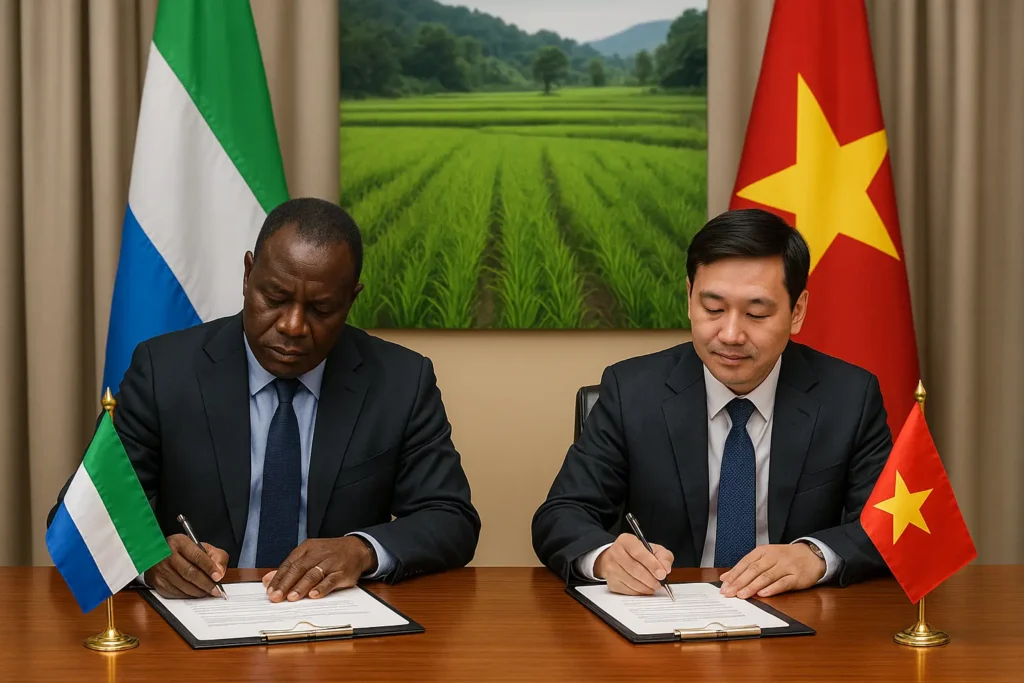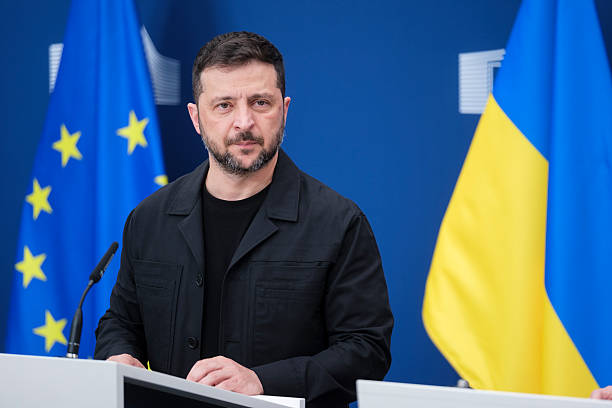
Sierra Leone Vietnam agriculture partnership aims to boost food security and expand trade through farming technology cooperation.
Analysts Predict Growing Cooperation in Food Security and Export Development
Amid shifting global trade dynamics and intensifying demand for diversified agricultural partnerships, Sierra Leone is positioning itself to deepen bilateral ties with Vietnam, potentially opening new avenues in agriculture, food security, and sustainable trade.
Although no formal agreement has yet been signed, analysts suggest ongoing dialogues and exploratory visits may soon yield concrete deals, placing both nations on a trajectory toward greater cooperation.
Growing Sierra Leone Vietnam Agriculture Trade Aspirations
Sierra Leone’s Ministry of Agriculture and Food Security has been quietly exploring opportunities for collaboration with Southeast Asian economies, with Vietnam emerging as a preferred partner.
Sources familiar with the matter told Epicstorian News that talks have centered on leveraging Vietnam’s expertise in rice production, aquaculture, and agricultural processing technologies—sectors where Sierra Leone seeks rapid growth to enhance both domestic supply and export potential.
“Vietnam’s agricultural transformation over the last three decades has been remarkable. It serves as a model for nations like Sierra Leone seeking to unlock agricultural value chains,” said Emmanuel Turay, a trade analyst at the Freetown-based Africa Policy Center.
Trade data shows bilateral trade between the two countries remains minimal, valued at less than $10 million annually, largely centered on Vietnam’s export of machinery and Sierra Leone’s raw commodities.
However, agricultural cooperation offers scope for significant expansion, according to trade watchers.
Lessons from Vietnam’s Agricultural Evolution
Vietnam’s rise as a global agricultural powerhouse—from rice to coffee and aquaculture—is widely studied across Africa.
The Vietnamese government has frequently shared technical expertise with developing nations under frameworks like the Vietnam-South-South Cooperation Program.
Sierra Leone’s government views this as a springboard to bolster its agricultural reform ambitions, particularly in rice self-sufficiency and fisheries.
“The potential cooperation would likely include training, technology transfer, and potentially Vietnamese investment in processing facilities within Sierra Leone,” said a senior official at the Ministry of Trade, who spoke on condition of anonymity due to ongoing discussions.
Political Will and Economic Context Driving Interest
Sierra Leone’s President Julius Maada Bio has repeatedly emphasized agricultural development as a pillar of national progress, citing food security and export diversification as core objectives of his administration.
Meanwhile, Vietnam’s growing footprint across Africa—particularly in energy, manufacturing, and logistics—aligns with Hanoi’s broader foreign policy of expanding ties beyond Asia-Pacific.
“Vietnam wants to deepen its diplomatic and trade presence in West Africa, and Sierra Leone offers a strategic entry point,” noted Dr. Mai Linh, a Southeast Asia-Africa relations scholar at the University of Hanoi. “Agriculture is the low-hanging fruit.”
The proposed cooperation fits within Sierra Leone’s broader strategy to reduce dependency on Western imports while enhancing its food production resilience against global supply shocks.
The country still imports over 60% of its rice needs annually, despite having fertile land and favorable conditions for production.
Potential Areas of Agricultural Partnership
- Rice cultivation technology and seed innovation
- Post-harvest processing and storage infrastructure
- Aquaculture development, particularly in inland fisheries
- Agri-tech training programs for smallholder farmers
- Market access facilitation through joint trade missions
Vietnamese delegations have reportedly visited Freetown in recent months, exploring investment climates and regulatory frameworks. While no formal memoranda have been signed, insiders describe the talks as “progressive and likely to materialize within the next fiscal year.”
Challenges Ahead: Infrastructure and Policy Alignment
Despite the optimism, analysts caution that meaningful progress hinges on infrastructure improvements within Sierra Leone’s agricultural sector, as well as clearer trade facilitation policies. Vietnam’s interest could wane if supply chain inefficiencies, port logistics, and regulatory hurdles remain unresolved.
“For this to work, Sierra Leone needs to address key bottlenecks—particularly around transportation and storage—which directly impact export competitiveness,” said an economic report by the African Development Bank.
Furthermore, currency fluctuations, political stability, and trade financing mechanisms remain factors foreign investors monitor closely. Yet the mutual benefits of such a partnership—market expansion for Vietnam and capacity building for Sierra Leone—are likely to drive sustained interest from both sides.
Regional Implications of a Potential Agreement
Should Sierra Leone and Vietnam formalize their agricultural cooperation, it could set a precedent for broader Asia-Africa engagements in the sector.
Other West African nations are watching these developments, with countries like Liberia and Guinea expressing similar interests in replicating Vietnam’s agricultural models.
“This could reshape how West Africa partners with Asia—not just as importers, but as co-developers of agricultural ecosystems,” said Dr. Turay.
Looking Ahead
As global food security remains a pressing issue, especially in the wake of climate change disruptions and geopolitical tensions, partnerships like the one brewing between Sierra Leone and Vietnam may become increasingly strategic.
Both nations have incentives to fast-track cooperation: Sierra Leone to reduce its import bill and enhance food sovereignty, Vietnam to secure new markets and demonstrate its soft power through development diplomacy.
Industry observers anticipate further announcements in the coming months, potentially during upcoming trade forums or bilateral summits.
Also Read:
While timelines remain speculative, the direction appears clear: Sierra Leone and Vietnam are cultivating more than crops—they’re cultivating a future of shared opportunity.

